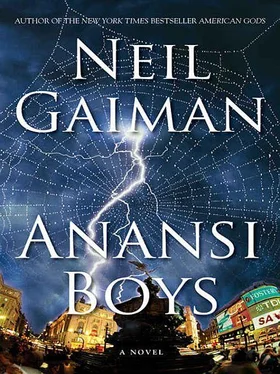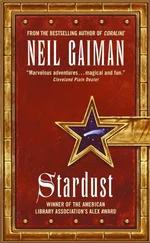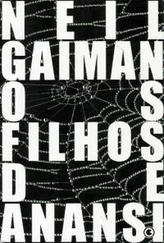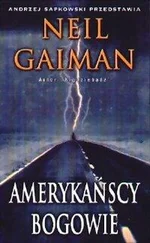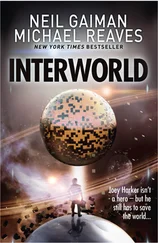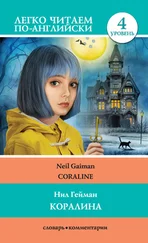They fell higgledy-piggledy, every which way. Spider scooped them up again. “Remember,” he said, “You can’t lie when you’re dead. “This time when he cast the bones they pointed unequivocally in one direction.
“That’s what I like,” said Spider. “Someone who honours his bets.”
He put the bird’s feathers on, and walked to the top of a hill. Ahead of him was a tear in the sky, a small rip in the coppery fabric of everything, and darkness spilled through it, and behind the darkness stars were twinkling. Spider no longer cared that it was uncool to run. Now he ran.
As he reached the bottom of the hill, birds descended around him.
“Stop!” they called.
He stopped. “I’m a bird,” he told them. “Just like you.” Even in the Bird Woman’s universe, he was certain that he had enough conviction to make the things he said true for those that heard them.
“What manner of bird are you?” asked a heron, puzzled. “An emu? An ostrich? A moa?”
“Yeah. Sure. Something like that,” said Spider. “Hey, have any of you seen Spider anywhere? I heard that he had escaped, and I was told to guard the way out of here.”
“We’re looking for him too,” said an eagle. “Haven’t seen him, though. Actually, we thought you might be him, when we saw you coming towards us.”
“No, you didn’t,” said Spider. “You thought I was just another bird.”
“Oh. Right. That was what we thought,” agreed the heron.
“So. You lot all wait here, and guard the way out,” said Spider. “And I’ll just put my head through there and make sure that he hasn’t got here ahead of us.”
Spider walked forward. He walked through the rip in the sky.
Ahead of him he could see an island. He could see a small mountain in the centre of the island. He could see a pure blue sky, and swaying palm trees, a white gull high in the sky. But even as he saw it the world seemed to be receding. It was as if he was looking at it through the wrong end of a telescope. It shrank and slipped from him, and the more he ran towards it the further away it seemed to get.
The island was a reflection in a puddle of water, and then it was nothing at all.
He was in a cave.The edges of things were crisp—crisper and sharper than anywhere that Spider had ever been before. This was a different kind of place.The feather she had worn fell to the rocky floor. He turned to the daylight.
She was standing in the mouth of the cave, between him and the open air. She had stared into his face in a Greek Restaurant in South London, and birds had come from her mouth.
“You know,” said Spider, “I was just in your world. And I have to say, you’ve got the strangest ideas about hospitality. You come to my world, I’d make you dinner, open a bottle of wine, put on some soft music, give you an evening you would never forget.”
Her face was impassive; carved from black rock it was. The wind tugged at the edges of her old brown coat. She spoke then, her voice high and distant as the wrenching call of a distant gull.
“I took you,” she said. “Now, you will call him.”
“Call him? Call who?”
“You will bleat,” she said.” You will whimper. Your fear will excite him.”
“Spider does not bleat,” he said. He was not certain it was true.
Eyes as black and as shiny as chips of obsidian stared back into his. They were eyes like black holes, letting nothing out, not even information.
“If you kill me,” said Spider, “my curse will be upon you.” He wondered if he actually had a curse. He probably did.
“It will not be I that kills you,” she said. She raised her hand, and it was not a hand but a raptor’s talon. She raked her talon down his face, down his chest, her cruel claws sinking into his flesh, ripping his skin.
It did not hurt, although Spider knew that it would hurt soon enough.
Beads of blood crimsoned his chest and dripped down his face. His eyes stung. His blood touched his lips. He could taste it and smell the iron scent of it.
“Now,” she said in the cries of distant birds. “Now your death begins.”
Spider said, “We’re both reasonable entities. Let me present you with a perhaps rather more feasible alternative scenario that might conceivably have benefits for both of us.” He said it with an easy smile. He said it convincingly.
“You talk too much,” she said. Then she reached into his mouth with her sharp talons, and with one wrenching movement she tore out his tongue.
“There,” she said. And then she said, “Sleep.”
How Dare You?
by Neil Gaiman
Nobody’s asked the question I’ve been dreading, so far, the question I have been hoping that no-one would ask. So I’m going to ask it myself, and try to answer it myself.
And the question is this: How dare you?
Or, in its expanded form,
How dare you, an Englishman, try and write a book about America, about American myths and the American soul? How dare you try and write about what makes America special, as a country, as a nation, as an idea?
And, being English, my immediate impulse is to shrug my shoulders and promise it won’t happen again.
But then, I did dare, in my novelAmerican Gods , and it took an odd sort of hubris to write it.
As a young man, I wrote a comic-book about dreams and stories called Sandman (collected, and still in print, in ten graphic novels, and you should read it if you haven’t). I got a similar question all the time, back then: “You live in England. How can you set so much of this story in America?”
And I would point out that, in media terms, the UK was practically the 51st state. We get American films, watch American TV. “I might not write a Seattle that would satisfy an inhabitant,” I used to say, “But I’ll write one as good as a New Yorker who’s never been to Seattle.”
I was, of course, wrong. I didn’t do that at all. What I did instead was, in retrospect, much more interesting: I created an America that was entirely imaginary, in which Sandman could take place. A delirious, unlikely place out beyond the edge of the real.
And that satisfied me until I came to live in America about eight years ago.
Slowly I realised both that the America I’d been writing was wholly fictional, and that the real America, the one underneath the what-you-see-is-what-you-get surface, was much more interesting than the fictions.
The immigrant experience is, I suspect, a universal one (even if you’re the kind of immigrant, like me, who holds on tightly, almost superstitiously, to his UK citizenship). On the one hand, there’s you, and on the other hand, there’s America. It’s bigger than you are. So you try and make sense of it.You try to figure it out—something which it resists. It’s big enough, and contains enough contradictions, that it is perfectly happy not to be figured out.As a writer, all I could do was to describe a small part of the whole.
And it was too big to see.
I didn’t really know what kind of book I wanted to write until, in the summer of 1998, I found myself in Reykjavik, in Iceland. And it was then that fragments of plot, an unwieldy assortment of characters, and something faintly resembling a structure, came together in my head. Either way, the book came into focus. It would be a thriller, and a murder mystery, and a romance, and a road trip. It would be about the immigrant experience, about what people believed in when they came to America. And about what happened to the things that they believed.
I wanted to write about America as a mythic place.
And I decided that, although there were many things in the novel I knew already, there were more I could find by going on the road and seeing what I found. So I drove, until I found a place to write, and then, in one place after another, sometimes at home, sometimes not, for nearly two years, I put one word after another, until I had a book. The story of a man called Shadow and the job he is offered when he gets out of prison. It tells the story of a small Midwestern town and the disappearances that occur there every winter. I discovered, as I wrote it, why roadside attractions are the most sacred places in America. I discovered many other strange by-ways and moments, scary and delightful and just plain weird.
Читать дальше
